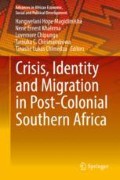Abstract
The Southern African region provides the backdrop that informs much of the complexities of mobility, border making and border crossing that the world is currently grappling with. With the global migration crisis intensifying, the movement of men, women and children in search of better opportunities will deepen and host countries will be challenged to integrate and revitalise new societies that will emerge as a result. It summarises seminal arguments around the possibilities of regional integration in Southern Africa as a regenerative mechanism. It further builds an ambitious imagining framework and reflects how the region can re-imagine borderless citizenship moving forward.
Access this chapter
Tax calculation will be finalised at checkout
Purchases are for personal use only
Notes
- 1.
In fact according to Mamdani (1996; 219), colonial states authorised their rule through direct and indirect rule and an organising logic for citizenship was characterised by both the incorporation of ‘native authorities’ and/or settler colonial governments in most African states. This characterised migrants who are deemed non-citizens as ‘free peasants’ in an urban industrial settings without fully incorporating them into the political, social, and economic fabric of colonial states.
References
Amin S (1972) Underdevelopment and dependency in Black Africa: origins and forms. J Mod Afr Stud 10(4):503–524
Benedetta R (2013) Migration and emancipation in West Africa’s labour history: the missing links, slavery & abolition. J Slave Post Slave Stud. doi:10.1080/0144039X.2013.796108
Bond P (2006) Looting Africa: the economics of exploitation. University of KwaZulu-Natal Press, Durban
Bond P, Kapuya T (2007) ‘Arrogant, disrespectful, aloof and careless’: South African Corporations in Africa. Open space. OSISA, South Africa
Bracking S, Sachikonye L (2008) Remittances, poverty reduction and informalization in Zimbabwe 2005-6: a political economy of dispossession? Brooks World Poverty Institute Working Paper No. 28, The University of Manchester
Castles S, Delgado Wise R (2008) Migration and development: perspectives from the South. International Organization for Migration (IOM), Geneva
Castles S, Miller M (2009) The age of migration, 4th edn. Guilford Press, New York
Crush J (2000) The dark side of democracy: migration, xenophobia and human rights in South Africa. Int Migr 38(6):103–133. International Organization for Migration (IOM)
Crush J, Williams V (2002) Criminal tendencies: immigrants and illegality in South Africa. Migration Policy Brief, No. 10, Southern African Migration Programme 15
Gigaba M (2015) Africa is Central to South Africa’s future. ANC Today 15(17)
Magidimisha HH, Gordon S (2015) Profiling South African gender inequality in informal self-employment. J Gend Stud 24:275–292
Makiwane M, Khalema NE (2015) Migration and development. In: Makiwane M, Chimere-Dan GC (eds) Eastern Cape: the state of the population 2014. Department of Social Development, South Africa, pp 76–84
Mamdani M (1996) Citizen and subject. Contemporary Africa and the legacy of late colonialism. Princeton
Mhone G (1997) Enclavity and constrained labour absorptive capacity in Southern African economies. In: Draft paper prepared for the discussion at the UNRISD meeting on The need to rethink development economics, 7–8 September, 2001, Cape Town, South Africa
Neocosmos M (2010) From ‘foreign natives’ to ‘native foreigners’: explaining xenophobia in post-apartheid South Africa. Citizenship and nationalism, identity and politics series. CODESRIA
Yinger NV (2006) Feminization of migration. Supported by the Fred H. Bixby Foundation. Available via http://www.prb.org/Articles/2006/TheFeminizationofMigration.aspx
Author information
Authors and Affiliations
Corresponding author
Editor information
Editors and Affiliations
Rights and permissions
Copyright information
© 2018 Springer International Publishing AG
About this chapter
Cite this chapter
Khalema, N.E., Magidimisha, H.H., Chipungu, L. (2018). Regeneration and Integration in Southern Africa: Concluding Comments on Contemporary Challenges and Possibilities. In: Magidimisha, H., Khalema, N., Chipungu, L., Chirimambowa, T., Chimedza, T. (eds) Crisis, Identity and Migration in Post-Colonial Southern Africa. Advances in African Economic, Social and Political Development. Springer, Cham. https://doi.org/10.1007/978-3-319-59235-0_13
Download citation
DOI: https://doi.org/10.1007/978-3-319-59235-0_13
Published:
Publisher Name: Springer, Cham
Print ISBN: 978-3-319-59234-3
Online ISBN: 978-3-319-59235-0
eBook Packages: Political Science and International StudiesPolitical Science and International Studies (R0)

